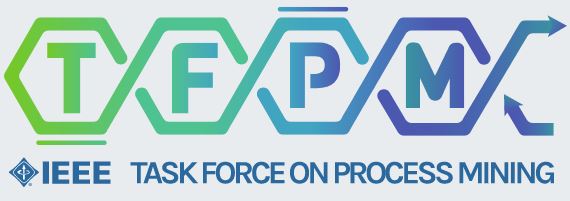- EdbA'22 -
Third International Workshop on Event Data and
Behavioral Analytics
Bozen - Bolzano, Italy, 24 October 2022
Co-located at ICPM 2022

An activity from the IEEE Task Force on Process Mining
Over the past decades, capturing, storing and analyzing event data has gained attention in various domains such as process mining, clickstream analytics, IoT analytics, e-commerce and retail analytics, online gaming analytics, security analytics, website traffic analytics and preventive maintenance, smart homes and offices, just to name a few. It even resulted in the birth of new research domains such as behavioral informatics, behavioral analytics and behavioral operations research. The interest in event data lies in its analytical potential as it captures the dynamic behavior of people, objects and/or systems at a fine-grained level.
While each of these domains have their own applications and idiosyncrasies, they share the common denominator of event data and the objective to analyze behavior. Yet, these domains also differ in underlying assumptions and techniques used. Therefore, the objective of this workshop is to provide a forum to practitioners and researchers for studying a quintessential, minimal notion of events as the common denominator for records of discrete behavior in all its forms, and to study, develop and discuss techniques and methods for behavioral analytics based on all kinds of events.
The Event Data & Behavioral Analytics (EdbA) workshop considers as its starting point the presence of event data being recorded at various sources and contexts, being stored in various forms, and being considered for analysis of behavior of various kinds. Event data at different levels of granularity are considered, ranging from frequent sensor-based events in IoT settings to recordings of aggregate or long-running behavior involving time intervals and rich information. Behavior often involves multiple entities, objects, and actors to which events can be correlated in various ways. In these situations, a unique explicit process notion does either not exist, is unclear or different processes or dynamics could be recorded in the same dataset.
The workshop aims to further the development of new (or the novel application of existing) techniques, algorithms and data structures for recording, storing, managing, processing, analyzing, and visualizing event data in various forms. The workshop welcomes two types of submissions, i.e. original research papers as well as case study reports on event data and behavioral analytics.
The topics considered in the workshop consist of, but are not limited to:
- Augmentation of fine-grained event data to higher-order activities or behavior
- Storage, integration, and querying of behavioral event data
- Representation and analysis of event data without a unique case identifier (without case identifier or with multiple case identifiers present)
- Monitoring and detection of complex behavior
- Diagnosis of behavior, including root-cause analysis, variance analysis, cluster analysis and many other exploratory analysis techniques
- Visual analytics of (complex) behavior
- Behavior Pattern detection, e.g., in real-time location data or other types of context-rich data
- Outlier Behavior Detection
- Behavior Prediction
- Prescriptive analytics which predicts behavior and prescribes which action could steer behavior in a specific direction
- Yannis Bertrand, Bram Van den Abeele, Silvestro Veneruso, Francesco Leotta, Massimo Mecella and Estefanía Serral. A Survey on the Application of Process Mining to Smart Spaces Data. (pdf)
- Lisan Wolters and Marwan Hassani. Predicting Activities of Interest in the Remainder of Customer Journeys Under Online Settings. (pdf)
- Paul Kobialka, Felix Mannhardt, Silvia Lizeth Tapia Tarifa and Einar Broch Johnsen. Building User Journey Games from Multi-party Event Logs. (pdf)
- Gemma Di Federico and Andrea Burattin. Do You Behave Always the Same? A Process Mining Approach. (pdf)
- Andrea Burattin, Hugo A. López and Lasse Starklit. Uncovering Change: A Streaming Approach for Declarative Processes. (pdf)
- Azadeh Sadat Mozafari Mehr, Renata Medeiros de Carvalho and Boudewijn van Dongen. Detecting Complex Anomalous Behaviors in Business Processes: a Multi-Perspective Conformance Checking Approach. (pdf)
- Maxim Vidgof and Jan Mendling. Leveraging Event Data for Measuring Process Complexity. (pdf)
- Alexandre Goossens, Johannes De Smedt, Jan Vanthienen and Wil van der Aalst. Enhancing Data-Awareness of Object-Centric Event Logs. (pdf)
- Adrian Rebmann, Peter Pfeiffer, Peter Fettke and Han van der Aa. Multi-perspective Identification of Event Groups for Event Abstraction. (pdf)
- Discussion on open problems, issues and trends in event data and behavioral analytics
All accepted papers are published by Springer in the Lecture Notes in Business Information Processing (LNBIP) series.
Organizing Committee
- Depaire Benoît, Hasselt University, Belgium
- Fahland, Dirk, Eindhoven University of Technology, the Netherlands
- Leotta, Francesco, Sapienza University of Rome, Italy
- Lu, Xixi, Utrecht University, the Netherlands
Program Committee
- Massimiliano de Leoni, University of Padua, Italy
- Jochen De Weerdt, Katholieke Universiteit Leuven, Belgium
- Claudio Di Ciccio, Sapienza University of Rome, Italy
- Chiara Di Francescomarino, Fondazione Bruno Kessler-IRST, Italy
- Bettina Fazzinga, DICES, University of Calabria, Italy
- Marwan Hassani, Eindhoven University of Technology, the Netherlands
- Gert Janssenswillen, Hasselt University, Belgium
- Felix Mannhardt, Eindhoven University of Technology, the Netherlands
- Niels Martin, Hasselt University, Belgium
- Jan Mendling, Humboldt-Universität zu Berlin, Germany
- Marco Montali, KRDB Research Centre, Free University of Bozen-Bolzano, Italy
- Marco Pegoraro, RWTH Aachen University, Germany
- Greg Van Houdt, Hasselt University, Belgium
- Stef van den Elzen, Eindhoven University of Technology, the Netherlands